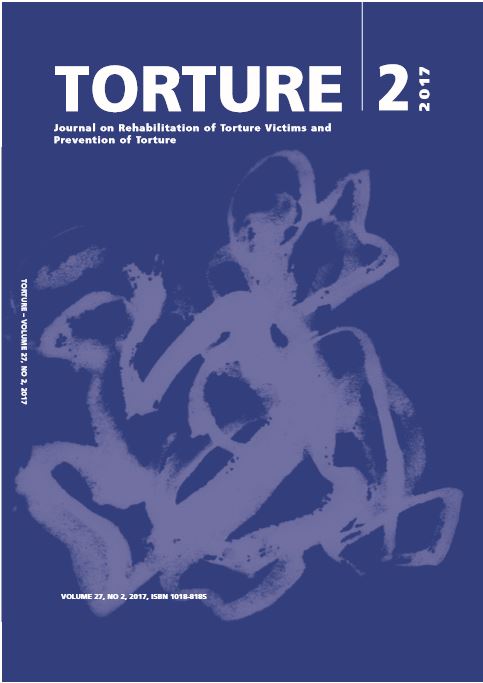The United States Supreme Court case Ziglar v. Abbasi and the severe psychological and physiological harms of solitary confinement
DOI:
https://doi.org/10.7146/torture.v27i2.97215Palabras clave:
Solitary Confinement, Detention, Immigration, Prisoner rights, Torture, Cruel and inhumane treatment, Racial profiling, Amicus, Psychological harm, US law, Constitutional lawResumen
In the aftermath of the September 11, 2001 terrorist attacks, a group of Middle Eastern, North African, and South Asian men was arrested for immigration violations, held as “terrorism suspects,” and detained in federal prison for months. Each of these men was, or was believed to be, Muslim or Arab. These men (the “Detainees”) alleged that they were detained solely on the basis of their religion or race, and that there was no individualized basis to suspect them of terrorism. They further alleged that, during their detention, they were abused physically and verbally and subjected to inhumane conditions, including solitary confinement. After several months, the Detainees were cleared of any connection to terrorism and deported. The Detainees allege that they suffered severe psychological and physiological harms as a result of the conditions of their detention and that they continue to suffer the effects of this trauma today.Citas
Allen, K. (2014). Researchers Study Effects of Prolonged Isolation Among Prisoners, The Toronto Star (Feb. 14, 2014). Retrieved from https:// www.thestar.com/news/world/2014/02/14/ researchers_study_effects_of_prolonged_isolation_among_prisoners.html
Appelbaum, K. (2015). Am. Psychiatry Should Join the Call to Abolish Solitary Confinement, 43 J. Am. Acad. Psychiatry & L. 406, 410.
Bennion, E. (2015). Banning the Bing: Why Extreme Solitary Confinement is Cruel & Far Too Usual Punishment, 90 Ind. L. J. 741, 756.
Bivens v. Six Unknown Named Agents of Federal Bureau of Narcotics, 403 U.S. 388 (1971).
Brief Of Medical And Other Scientific And HealthRelated Professionals As Amici Curiae In Support Of Respondents And Affirmance, Ziglar v. Abbasi, No. 15-1358 (Dec. 22, 2016). Retrieved from https://ccrjustice.org/sites/default/ files/attach/2016/12/Medical_and_Other_Scientific_and_Health-Related_Professionals_Amicus.pdf (“the Brief” or “the Solitary Confinement Brief”).
CANY (2004). Mental Health in the House of Corrections: A Study of Mental Health Care in New York State Prisons, pp. 58-59.
Center for Constitutional Rights (2017). Ziglar v. Abbasi (formerly Turkmen v. Ashcroft). Retrieved from https://ccrjustice.org/ziglar-v-abbasi. Fujio, C. et al., (2013).
Physicians for Human Rights, Buried Alive: Solitary Confinement in the U.S. Detention System, pp. 1-2. Grassian, S. (1983). Psychopathological Effects of Solitary Confinement, 140 Am. J. Psychiatry 1450, 1453.
Haney, C. (2003). Mental Health Issues in Long Term Solitary and “Supermax” Confinement, 49 Crime & Delinq. 124, 130-31. International Committee of the Red Cross (ICRC) (n.d.). Customary IHL - Rule 90, Torture & Cruel, Inhuman or Degrading Treatment. Retrieved from https://ihldatabases.icrc.org/ customary-ihl/eng/docs/v1_rul_rule90.
Kaba F. et al. (2014). Solitary Confinement & Risk
of Self-Harm Among Jail Inmates, 104 Am. J. of Pub. Health 442, 442.
Martel, J. (1999). Solitude & Cold Storage: Women’s Journeys of Endurance in Segregation, Elizabeth Fry Soc’y of Edmonton, 87.
Shalev, S. (2008). A Sourcebook on Solitary Confinement, Mannheim Centre for Criminology, London School of Economics and Political Science, 20. Memorandum Opinion, Turkmen v. Hasty, No. 13-981 (2d Cir. June 17, 2015). Retrieved from https:// ccrjustice.org/sites/default/files/attach/2015/06/ Turkmen%20v.%20Ashcroft%20Second%20 Circuit%20Ruling%206-17-15.pdf
Fourth Amended Complaint, Turkmen v. Ashcroft, No. 02 CV 2307 (SMG) (E.D.N.Y. Sept. 13, 2010) (the “Complaint”). United Nations General Assembly (2015) Res. 70/175, Rule 44. Retrieved from http://www. un.org/en/ga/search/view_doc.asp?symbol=A/ RES/70/175 (“the Nelson Mandela Rules”)
Vasiliades, E. (2005). Solitary Confinement & Int’l Human Rights; Why the U.S. Prison System Fails Global Standards, 21 Am. U. Int’l L Rev. 71, 76-77. Ziglar v. Abba
Descargas
Publicado
Cómo citar
Número
Sección
Licencia
We accept that some authors (e.g. government employees in some countries) are unable to transfer copyright. The Creative Commons Licence Attribution-NonCommercial-NoDerivatives 4.0 International (CC BY-NC-ND 4.0) covers both the Torture Journal and the IRCT web site. The publisher will not put any limitation on the personal freedom of the author to use material contained in the paper in other works which may be published, provided that acknowledgement is made to the original place of publication.


